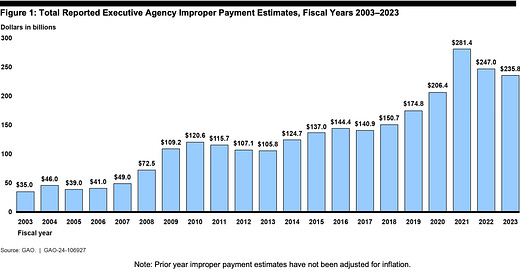In just one year, Washington improperly spent $236 billion. Think that's bad? In the past 20 years that comes to $2.7 trillion.
“A billion here, a billion there, and pretty soon you're talking real money" — attributed to the late Illinois senator Everett Dirksen,
Except now it has become “a trillion here and a trillion there…”
We’ve gotten so used to unimaginably huge numbers, they no longer are breathtaking. So here’s some context:
That $2.7 trillion exceeds the $2.6 trillion that Congress appropriated in four Covid relief laws, such as the CARES Act, in 2020. That’s $2.7 trillion down the drain. Outta sight.
That’s the conclusion of the U.S. Government Accountability Office, the outfit that’s in charge of such depressing matters. According to the GAO, “improper payments” are “payments that should not have been made or were made in the incorrect amount.”
Some of that is fraud*, but not all of it. The GAO notes,”fraud may be the reason why improper payments have been made. But fraud doesn't necessarily have to involve payments—e.g., passport fraud.”
Well, that’s a relief. Simple incompetence or confusion explains why much of that money going to the wrong place.
For the masochists among you, here’s the link that’ll let you read the full, dismal report.
In an all-too-brief summary, the GAO found that five categories of spending accounted for about 79 percent or about $186 billion of the fiscal year 2023 total: They are Medicare, Medicaid, Federal Pandemic Unemployment Assistance, Earned Income Tax Credit and Paycheck Protection Program Loan Forgiveness. No surprise there.
But notice that two of the five categories are related to Covid pandemic “relief,” amounting to $62.3 billion. Gone, gone, gone to where, does anyone know? Isn’t that some kind of record?
Also notice that the, “$236 billion total does not include estimates for certain risk-susceptible programs, such as the Department of Health and Human Services’ Temporary Assistance for Needy Families program.”
Furthermore, notice that military spending doesn’t make it into the top five. We’re supposed to believe that the Pentagon keeps the worst track of where its money goes.
And further, furthermore, notice that the worst years (in the graph below) came during Biden’s years in office. Even though Biden could crow that he’s reduced the amount of “improper spending,” his term still marked the worst of two decades.
And so it goes.
*The difference between fraud and improper payments, according to the GAO:
Improper payments are any payments that should not have been made or that were made in an incorrect amount. Fraud involves obtaining a thing of value through willful misrepresentation. Improper payments and fraud involving federal funds are two distinct concepts that are related, but not interchangeable. For example, while all fraudulent payments are considered improper, not all improper payments are due to fraud. Similarly, there are types of fraudulent activity that do not result in improper payments (i.e., nonfinancial fraud).





